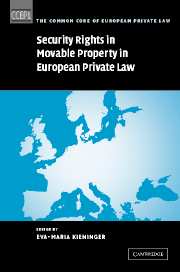Book contents
- Frontmatter
- Contents
- General editors' preface
- Preface
- List of contributors
- Table of cases cited by name
- Table of legislation
- Part I Introduction and context
- Part II The case studies
- List of abbreviations
- Bibliographies
- Glossary
- Case 1 Furniture for a new office
- Case 2 The deceived seller
- Case 3 Machinery supplied to be used by the buyer
- Case 4 Jackets for resale
- Case 5 Motor cars supplied and resold (I)
- Case 6 Motor cars supplied and resold (II)
- Case 7 Supply of material to manufacturer (I)
- Case 8 Supply of material to manufacturer (II)
- Case 9 Too many toasters
- Case 10 Bank loan on the basis of a car fleet
- Case 11 Bank loan for a wholesaler
- Case 12 Bank loan on the basis of money claims (I)
- Case 13 Bank loan on the basis of money claims (II)
- Case 14 Finance leasing of computers
- Case 15 Indebted businessman sells business to brother
- Evaluation: a common core? Convergences, subsisting differences and possible ways for harmonisation
- Index by country
- Index by subject
Case 2 - The deceived seller
Published online by Cambridge University Press: 23 December 2009
- Frontmatter
- Contents
- General editors' preface
- Preface
- List of contributors
- Table of cases cited by name
- Table of legislation
- Part I Introduction and context
- Part II The case studies
- List of abbreviations
- Bibliographies
- Glossary
- Case 1 Furniture for a new office
- Case 2 The deceived seller
- Case 3 Machinery supplied to be used by the buyer
- Case 4 Jackets for resale
- Case 5 Motor cars supplied and resold (I)
- Case 6 Motor cars supplied and resold (II)
- Case 7 Supply of material to manufacturer (I)
- Case 8 Supply of material to manufacturer (II)
- Case 9 Too many toasters
- Case 10 Bank loan on the basis of a car fleet
- Case 11 Bank loan for a wholesaler
- Case 12 Bank loan on the basis of money claims (I)
- Case 13 Bank loan on the basis of money claims (II)
- Case 14 Finance leasing of computers
- Case 15 Indebted businessman sells business to brother
- Evaluation: a common core? Convergences, subsisting differences and possible ways for harmonisation
- Index by country
- Index by subject
Summary
(Transfer of property – effect of fraud – effects of execution on property law questions)
B persuades A to sell him a painting. Although B knows that it is an early and unusual work of William Turner, he induces A to believe that the painting was by an unknown artist. The purchase price is fixed at 500 Euros. On 1 March, A delivers the painting to B. B immediately pays the purchase price. On 15 March, C, a creditor of B, executes against B's property, including the painting. On 20 March, A discovers the truth. He avoids the sale on the ground of fraud and demands the return of the painting.
Question
Can A claim the painting free of any rights of B or of the creditor of B?
Discussions
GERMANY
Ownership of the painting passed to B with the conclusion of the real agreement (Einigung) and delivery (§ 929 BGB). As stated supra, the transfer of ownership is independent of the contract of sale. Since in the present case only the contract of sale has been avoided, the transfer of ownership remains valid. A cannot vindicate the painting. He has only a claim against B based on unjust enrichment (§ 812 s. 1 sent. 1, alternative 1 BGB, condictio indebiti).
- Type
- Chapter
- Information
- Security Rights in Movable Property in European Private Law , pp. 230 - 245Publisher: Cambridge University PressPrint publication year: 2004

